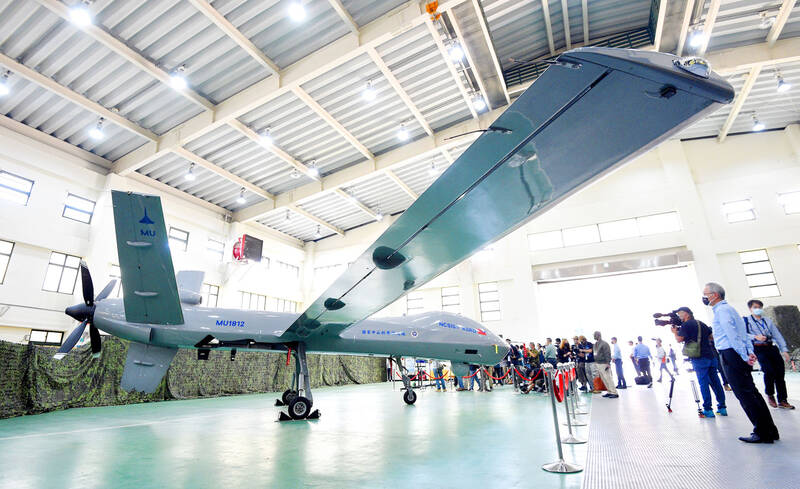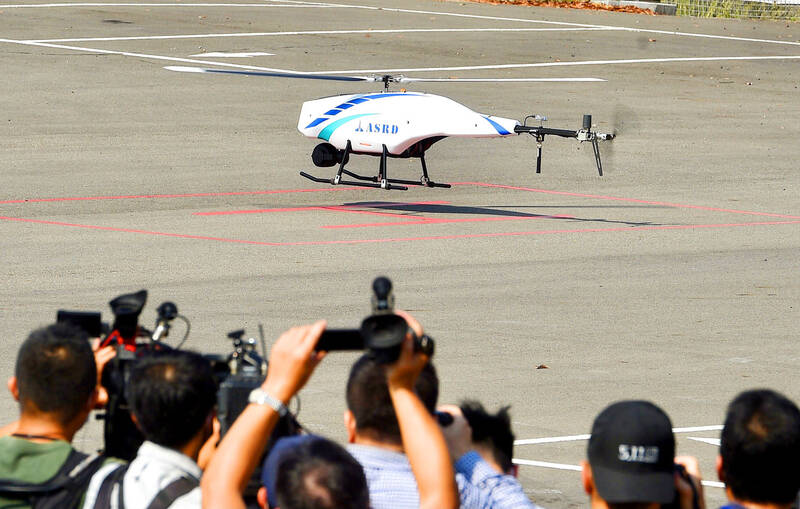The Chungshan Institute of Science and Technology yesterday unveiled its newest tactical close-range rotary-wing uncrewed aerial vehicle (UAV), saying that once it enters service, it would be tasked with tactical reconnaissance and monitoring of littoral and coastal areas.
The drone has a larger carrying capacity than its predecessors, can stay airborne for longer periods, provide extended monitoring of specific areas and withstand up to Beaufort scale 6 winds, the institute told a news conference in Taichung.
The Republic of China Army ordered 50 drones at a cost of NT$779.98 million (US$25.1 million) and has received 14 as of this year, army Chief of Staff Chang Yuan-hsun (章元勳) has said.

Photo: Lo Pei-te, Taipei Times
With the institute’s assistance, the army has 115 trained operators who have passed certification tests by the Civil Aeronautics Administration, Chang said.
The drone has a navigation and control radius larger than 30km, which, coupled with its ability to stay airborne for more than an hour, could enhance the military’s ability to reconnoiter and gain intelligence beyond visual range in real-time, said Chi Li-ping (齊立平), director of the institute’s Aeronautical Systems Research Division.
The drone can take off or return to base with just a tap of a button, follow preset routes and stay stationary to collect information, Chi added.

Photo: Lo Pei-te, Taipei Times
The institute also introduced the Teng Yun, or “Cloud Rider,” a large UAV designed to focus on range and digital intelligence gathering, the institute said.
Teng Yun can reach altitudes that allow it to be guided and controlled by satellites, stay airborne for long periods, has a large payload capacity, can autonomously land and take off via multiple uplink navigation and control uplink methods, and can provide long-range monitoring in real-time, it said.
Once fielded, the Teng Yun would allow the military’s drone fleet to be guided and controlled via satellite, the institute said, adding that it has completed development evaluations and is to undergo combat evaluations next year.
Asked what measures are being taken to prevent the use of China- manufactured parts, Chi said the institute conducts a thorough background check of all partner corporations and only collaborates with a company after verifying that it is not funded by Chinese capital and does not conduct large business transactions with China.
The institute also conducts rigorous security checks on all outgoing and incoming personnel while ensuring that all companies bidding for its projects sign a non-disclosure agreement and provide certified proof of the origins of their products, Chi said.

INVESTIGATION: The case is the latest instance of a DPP figure being implicated in an espionage network accused of allegedly leaking information to Chinese intelligence Democratic Progressive Party (DPP) member Ho Jen-chieh (何仁傑) was detained and held incommunicado yesterday on suspicion of spying for China during his tenure as assistant to then-minister of foreign affairs Joseph Wu (吳釗燮). The Taipei District Prosecutors’ Office said Ho was implicated during its investigation into alleged spying activities by former Presidential Office consultant Wu Shang-yu (吳尚雨). Prosecutors said there is reason to believe Ho breached the National Security Act (國家安全法) by leaking classified Ministry of Foreign Affairs information to Chinese intelligence. Following interrogation, prosecutors petitioned the Taipei District Court to detain Ho, citing concerns over potential collusion or tampering of evidence. The

‘FORM OF PROTEST’: The German Institute Taipei said it was ‘shocked’ to see Nazi symbolism used in connection with political aims as it condemned the incident Sung Chien-liang (宋建樑), who led efforts to recall Democratic Progressive Party (DPP) Legislator Lee Kun-cheng (李坤城), was released on bail of NT$80,000 yesterday amid an outcry over a Nazi armband he wore to questioning the night before. Sung arrived at the New Taipei City District Prosecutors’ Office for questioning in a recall petition forgery case on Tuesday night wearing a red armband bearing a swastika, carrying a copy of Adolf Hitler’s Mein Kampf and giving a Nazi salute. Sung left the building at 1:15am without the armband and apparently covering the book with a coat. This is a serious international scandal and Chinese

Seventy percent of middle and elementary schools now conduct English classes entirely in English, the Ministry of Education said, as it encourages schools nationwide to adopt this practice Minister of Education (MOE) Cheng Ying-yao (鄭英耀) is scheduled to present a report on the government’s bilingual education policy to the Legislative Yuan’s Education and Culture Committee today. The report would outline strategies aimed at expanding access to education, reducing regional disparities and improving talent cultivation. Implementation of bilingual education policies has varied across local governments, occasionally drawing public criticism. For example, some schools have required teachers of non-English subjects to pass English proficiency

NEGOTIATIONS: The US response to the countermeasures and plans Taiwan presented has been positive, including boosting procurement and investment, the president said Taiwan is included in the first group for trade negotiations with the US, President William Lai (賴清德) said yesterday, as he seeks to shield Taiwanese exporters from a 32 percent tariff. In Washington, US Trade Representative Jamieson Greer said in an interview on Fox News on Thursday that he would speak to his Taiwanese and Israeli counterparts yesterday about tariffs after holding a long discussion with the Vietnamese earlier. US President Donald Trump on Wednesday postponed punishing levies on multiple trade partners, including Taiwan, for three months after trillions of US dollars were wiped off global markets. He has maintained a 10 percent